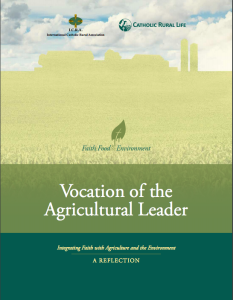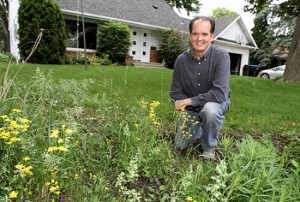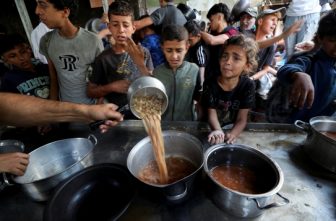“You’ve got to share this.”
James Ennis has heard those words repeatedly in recent years after presenting across the U.S. on the relationship between faith, farming and the Catholic tradition.
The executive director of St. Paul-based Catholic Rural Life, Ennis said farmers, ranchers and even an agricultural student have told him that they had no idea the Church had something to say about agriculture, and they wanted to hear more.
A document released earlier this month aims to fill that void by outlining the importance the Church places on agriculture and those engaged in it.

The 32-page “Vocation of the Agricultural Leader: Integrating Faith with Agriculture and the Environment” affirms the dignity of farmers, agribusiness leaders, policy makers, nutrition advocates and others working with the land and food production, and encourages them in the context of faith and Catholic tradition.
The document “is really retrieving the idea of vocation for all those involved in agriculture,” Ennis said. “There’s a special, unique role that farmers, ranchers and all those involved in agricultural production and bringing food to our tables play in how important it is, and the Church affirms it.”
Ennis is president of the Rome-based International Catholic Rural Association, of which CRL is a member. He developed the document with Christopher Thompson, CRL board member and director of the Center for Theological Formation at the St. Paul Seminary School of Divinity in St. Paul.
Global in nature, the document defines “agricultural leader” broadly, applying it to people who work directly with the land to an agribusiness executive.
“An agricultural leader . . . is simply someone who recognizes and affirms the responsibilities he has toward others, to God, and creation itself,” it states.
It roots the vocation in the Garden of Eden, when God told Adam to cultivate and keep the land, prior to the fall.
“This privileged way of life precedes the trauma of original sin and provides an insight into the place of the human person within the broader order of creation,” it states. “From the very beginning, whether through the cultivation of its fruits, the preservation of its lands or the contemplation of its beauty, man finds in his engagement with creation an encounter with the Creator himself.”

The document outlines challenges farmers face, such as the decline of the family farm, and agricultural policies that result in human and resource degradation. However, it is not intended to be a litany of what’s wrong with food production, but rather one that affirms those involved, Ennis said.
“You’re working with creation and you’re working in step with the Holy Spirit to do something really good in providing food for others,” Ennis said. “It just changes everything, I believe, when one sees what they do as not merely an occupation but a vocation.”
Papal attention
Ennis presented “Vocation of the Agricultural Leader” to Pope Francis at the Vatican Dec. 10 at an audience for Catholic rural leaders. Among them were Thompson and Doug Peterson, president of the Minnesota Farmers Union. Ennis called it an “incredible experience” and noted that Pope Francis seemed well briefed on the International Catholic Rural Association’s work.
Peterson, a parishioner of St. Michael in Madison, said the document’s ecumenical application is key. Just as Pope Francis addressed his 2015 encyclical “Laudato Si’: On Care for our Common Home” to the whole world, “Vocation of the Agricultural Leader has broad appeal, he said.
Peterson especially appreciates the document’s support for the family farm, which make up about 90 percent of the roughly 1 billion farms in the world, he said.
“We want the peace and the justice and the fairness so those people can sustain themselves and sustain farmers as economic unit, and a unit that can produce food,” he said.
He quoted Pope Francis’ words to farmers at the audience: “Agriculture is no longer considered a primary sector of the economy, yet it clearly contributes to the importance of policies of development for addressing disparities in food securities and issues in the life of rural communities.”
Thompson said he hoped that the pope’s attention to the document helps it get into the hands of people around the globe.
“My hope is that in reading it farmers feel affirmed in their dignity, and farmers begin to recognize the incredible importance of their work, in terms of not just care of the earth but really being protectors of culture more broadly. In their practices, the future of the human community rests,” he said.
“Much of our health and well being depends upon prudent and wise practices of their farmers,” he added. “In some ways, they’re a much neglected part of the modern dialogue, but that’s only to the detriment of all.”

Ennis and Thompson were inspired to write the document after the 2012 release of “Vocation of the Business Leader,” a project of the University of St. Thomas’ Center for Catholic Studies in St. Paul and the Pontifical Council for Justice and Peace.
They told the council’s president, Cardinal Peter Turkson, that farmers could benefit from a similar document. Cardinal Turkson told them to spearhead it, they said. So they did.
“Vocation of the Agricultural Leader” was already in the works when Pope Francis promulgated “Laudato Si’,” which outlined some of the same ideas and enhanced the new document.
As part of the project that has yielded the document, Catholic Rural Life hosted a national symposium “Faith, Food and the Environment” at St. Thomas in St. Paul in 2014 and an international symposium in Milan a year later. It also gathered input from farmers and other experts worldwide.
Most of the document was written in the past year. CRL leaders are now engaged in a series of presentations across the U.S. on the topic.
The International Catholic Rural Association published the document in collaboration with Catholic Rural Life. Partners included the Pontifical Council for Justice and Peace and Farmers Union Enterprises, a collaboration of the Minnesota Farmers Union, Montana Farmers Union, North Dakota Farmers Union, South Dakota Farmer Union and Wisconsin Farmers Union.
Ennis said he hopes “Vocation of the Agricultural Leader” brings about “conversion” and “transformation” for its readers, helping them to see “agriculture in a different light” as “more than just working with dirt.”
“It is a noble vocation, but what’s happened is that we’ve reduced it to just an occupation,” he said. “We’ve taken the moral content out of it and instead leveled it. Now we want to ennoble it because it is so critical to life, especially when you’re working with creation in such a tangible way.”
The document was published in English, Spanish, French and Italian, with a forthcoming translation in Tagalog. Ennis plans to gather feedback over the next year in preparation for a second edition, which he expects to be published by the Pontifical Council for Justice and Peace.
Read the document online or order copies at www. catholicrurallife.org.




